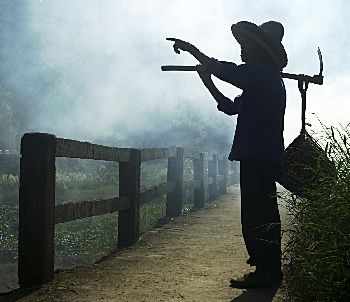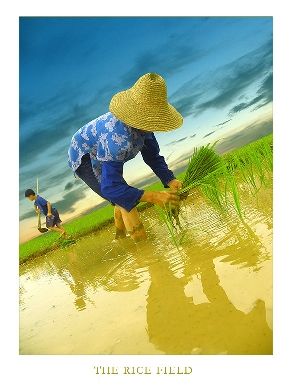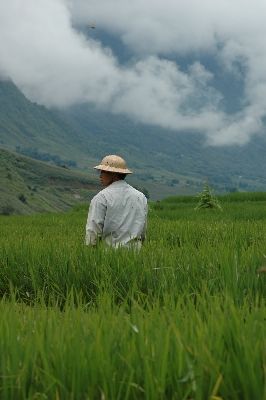
Publisher:
Bonnie King
CONTACT:
Newsroom@Salem-news.com
Advertising:
Adsales@Salem-news.com

~Truth~
~Justice~
~Peace~
TJP
Nov-30-2009 14:18

 TweetFollow @OregonNews
TweetFollow @OregonNews
Up in Smoke: The Power of Sacrifice
Doug Dickerson Salem-News.comA rice farmer who torched his own crops teaches us to observant, invest in others, and to come together to weather the storm.
 Photos courtesy: dougsmanagementmoment.blogspot.com |
(CHARLESTON, S.C.) - I don’t have to tell you that these are challenging economic times we are living in. In this time of economic challenge, making sacrifices is no longer an option for many organizations. Budgets are being cut, raises are set aside, and discretionary spending is being watched closer than ever. Maintaining strong morale during times of sacrifice can be a challenge.
Warren Lamb shares a story of a Japanese seaside village a hundred years ago that experienced an earthquake that startled the villagers one evening. Being so accustomed to earthquakes and not feeling another, they soon went back to their activities without giving it another thought.
An old farmer was watching from his home on a high plain above the village. He looked out at the sea and noticed that the water appeared dark and was acting strangely, moving against the wind and running away from the land. The old man knew what that meant. His one thought was to warn the people in the village below. He called to his grandson, “Bring me a torch! Hurry!”
In the fields behind him lay his great crop of rice that was piled high in stacks that were ready for market; it was worth a fortune. The old man hurried out to see the stacks with his torch. In a flash the dry stalks were ablaze. Soon the big bell pealed from the temple below: Fire!

Back from the beach, away from the sea, up the steep side of the cliff came the people of the village, running as fast as they could. They were trying to save the crops of their neighbor. “He’s mad!” they said when they saw he just stood there watching them come and staring toward the sea.
As they reached the level of the fields the old man shouted at the top of his voice over the roaring of the flames while pointing toward the sea, “Look!” At the edge of the horizon they saw a long, thin, faint line – a line that grew thicker as they watched.
That line was the sea, rising like a wall, getting higher and coming more and more swiftly as they stared. Then came the shock, heavier than thunder; the great wall of water struck the shore with a fierceness and a force that sent a shudder through the hills and tore homes below into matchsticks. The water withdrew and with a roaring sound. Then it returned and struck again, and again, and again.
One final time it struck and ebbed, then returned to its place and its pattern. On the plain no one spoke a word for a long while. Finally, the voice of the old man could be heard, saying softly, gently, “That’s why I set fire to the rice.”
He now stood among them just as poor as the poorest of them; his wealth was gone – all for the sake of 400 lives. By that sacrifice he will long be remembered, not by his wealth. He was not saddened by what his sacrifice cost him; he was overjoyed at what was saved.

The rice farmer teaches us valuable lessons about leadership. What are they? Let’s examine.
He was observant. Leaders pay attention to what is taking place around them. He saw the pending danger and immediately began to warn the villagers below. He understood his responsibility and acted on it.
He was personally invested in the well-being of others. He sacrificed his own fortune for the lives of his fellow villagers. Crops can be replanted, the village could be rebuilt, but the lives of the villagers could never be replaced. In other words, he had his priorities right.
Alan McGinnis said, “We lead best when we seek the welfare of those we lead, when we seek to serve rather than being served.” The rice farmers’ self interests would have been served by not torching his crops and letting the villagers worry about themselves. He teaches us that there are some things more valuable than wealth.
Finally, he shows us that when people come together they can weather the storm. The people ran to save the farmers’ crop. What they didn’t understand at the time was that they were saving themselves.
We will weather this economic crisis as we come together not out of selfish ambition, but out of true care and concern for our fellow man. Margaret Mead said, “Never doubt that a small group of thoughtful, committed citizens can change the world. Indeed it’s the only thing that ever has.”
A rice farmer who torched his own crops teaches us to be observant, invest in others, and to come together to weather the storm.
 Doug Dickerson is the former editor of the Berkeley Independent newspaper in South Carolina and is currently the Director of Management Moment Leadership Services. Doug’s writing has been recognized by the South Carolina Press Association, having won awards for enterprise reporting, series of articles, and for humor column writing.
Doug Dickerson is the former editor of the Berkeley Independent newspaper in South Carolina and is currently the Director of Management Moment Leadership Services. Doug’s writing has been recognized by the South Carolina Press Association, having won awards for enterprise reporting, series of articles, and for humor column writing.
Doug’s passion for communicating leadership principles and personal development is crystallized through his Management Moment column and leadership columns he writes. Read more of Doug’s columns on his blog at dougsmanagementmoment.blogspot.com
Articles for November 29, 2009 | Articles for November 30, 2009 | Articles for December 1, 2009

Salem-News.com:
Quick Links
DINING
Willamette UniversityGoudy Commons Cafe
Dine on the Queen
Willamette Queen Sternwheeler
MUST SEE SALEM
Oregon Capitol ToursCapitol History Gateway
Willamette River Ride
Willamette Queen Sternwheeler
Historic Home Tours:
Deepwood Museum
The Bush House
Gaiety Hollow Garden
AUCTIONS - APPRAISALS
Auction Masters & AppraisalsCONSTRUCTION SERVICES
Roofing and ContractingSheridan, Ore.
ONLINE SHOPPING
Special Occasion DressesAdvertise with Salem-News
Contact:AdSales@Salem-News.com

googlec507860f6901db00.html

Terms of Service | Privacy Policy
All comments and messages are approved by people and self promotional links or unacceptable comments are denied.
synthia December 1, 2009 9:34 am (Pacific time)
weed is wutt u need :]
[Return to Top]©2025 Salem-News.com. All opinions expressed in this article are those of the author and do not necessarily reflect those of Salem-News.com.